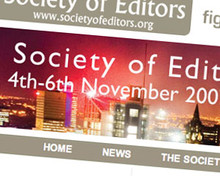
Delivering the opening lecture at the Society of Editors conference, in Manchester last night, O'Reilly accused them of oversimplifying the print versus digital debate and prematurely announcing the death of the newspaper.
"There seems to be a new sport in the sometimes cliquey, over-reported and London-centric world of UK media - and that is the growing tide of reportage on the demise of newspapers - and too often it is written with a misguided sense of authority and bizarrely, with a large does of glee," he told delegates.
(Listen here to the attack. Here and here for other elements of the speech)
Some senior newspaper industry commentators, he added, were guilty of failing to look beyond 'simple rhetoric' when declaring that the future lay almost exclusively online.
Instead, he said, newspapers were in 'rude health'; reiterating a sentiment of Rupert Murdoch's, he said he 'shared the concerns of those who fret about the future of newspapers, I have never shared their sense of gloom'.
He went on to say that unanswered 'doom and gloom' from leading commentators was 'the most bizarre case of wilful self-mutilation ever in the annuls of the industry'.
"Those with the loudest voice, or with the most provocative viewpoint, those armed with reams with the latest short-term statistics from ABC figures or the latest quarterly financial results are the ones that are unfortunately shaping the perception of our industry," he told delegates.
"The perception is ladies and gentlemen is that the printed newspaper is on an inexorable slide downward and to convey that over-statement appears to be the modus operandi of many of these commentators."
O'Reilly added that it was not simply a case of shooting the messenger, but one of commentators over-simplifying a more complex set of issues.
"What really irks me is that so many commentators fail to contextualise their often strident positions and fail to recognise the newspapers relative position in the busy media matrix," he said.
He added that newspapers were well positioned to weather the storm of media fragmentation and proclaimed that their biggest threat was not the internet but reader apathy, suggesting that in the UK downturn in print readerships was caused by the explosion of freesheets on the market and the short-term focus of promotion-heavy distribution, the effects of which, he added, were not being appropriately attributed.
During his robust broadside he added that the industry itself had developed a herd mentality and become complacent, allowing internet search engines to think that 'our copy is their copy'.
He also urged media commentators to pay much greater attention to consumer habits - 'Do any of us really know what people are doing online?' - and added that he believed quality journalism would stand the test of time against the 'constant onslaught of technological innovation'.
Free daily newsletter
If you like our news and feature articles, you can sign up to receive our free daily (Mon-Fri) email newsletter (mobile friendly).
Related articles
- Bertrand Pecquerie steps down as director of World Editors Forum
- WAN-IFRA loses director general Timothy Balding
- Number of daily newspapers worldwide increased last year, says survey
- WAN-IFRA calls off annual conference in Beirut
- #WANIndia2009: Ria Novosti - 'Infographics give us a competitive edge'









